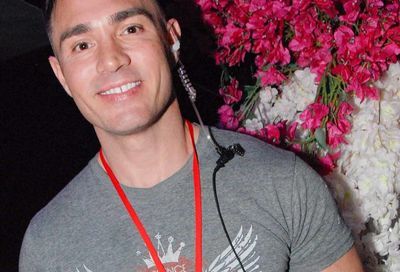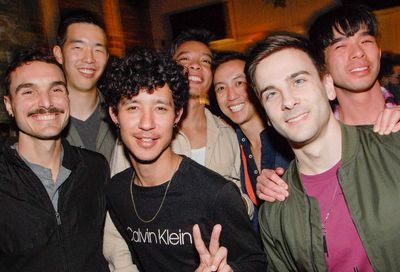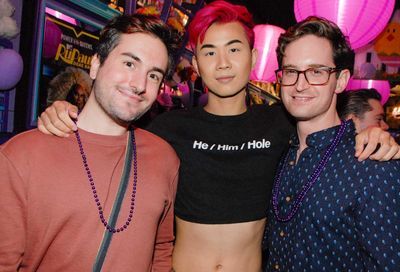The 2014 D.C. Attorney General Campaigns: Lorie Masters (D)
 METRO WEEKLY: What do you think should be the nature of the attorney general’s relationship with both the Council and the mayor? As Democrats, can voters trust that you will be able to remain independent of the mayor, the Council, and particularly the D.C. Democratic Party when it comes to aggressive oversight and enforcing D.C.’s laws?
METRO WEEKLY: What do you think should be the nature of the attorney general’s relationship with both the Council and the mayor? As Democrats, can voters trust that you will be able to remain independent of the mayor, the Council, and particularly the D.C. Democratic Party when it comes to aggressive oversight and enforcing D.C.’s laws?
Lorie Masters (D): Because the Office of the Attorney General is independent of the mayor and the D.C. Council, I respect the right of the mayor and D.C. councilmembers to secure legal counsel for themselves and for the agencies that report to them.
Nevertheless, the Office of the Attorney General must assert the principal role in coordinating and leading the District’s legal affairs. To that end, I will establish an Office of Government Outreach to help maintain relationships with not only the mayor and the Council, but also with lawyers in the various District agencies.
The legislation creating the elected attorney general will move oversight and reporting of such agency counsel from the attorney general’s office back into the agencies. The existing structure was changed to prevent situations that took place when District agencies sometimes took one position on a legal issue, and the attorney general’s office took another.
Given that change in reporting, it will be important for me as attorney general to develop a good working relationship with the various agency counsel and department heads, to ensure that the District speaks with one voice on legal issues and to ensure that agencies provide the witnesses, evidence and other assistance that will be necessary when the office of attorney general represents the agencies in court.
Neither gratitude for political support, nor loyalty to party, or allegiances with the mayor or councilmembers will keep me from fairly and aggressively fulfilling the duties of the attorney general.
My 30 years of practice as a member of the bar shows my integrity, fairness and impartiality. I will do my job; and the only people who need worry are those who violate the law or act against the people’s interests.
MW: Realizing that bias enhancements are more difficult to “prove” in a court of law, what can the attorney general do to ensure that crimes motivated by anti-LGBT bias are properly prosecuted, beyond merely providing lip service to the LGBT community?
Masters: In their communication with attorney general candidates, the Gay and Lesbian Activists Alliance reported that DC’s appointed attorneys general, and, before that, DC’s Corporation Counsel “had a long history of trampling on the rights and interests of the District’s LGBT community.” I assured GLAA, and I assure you, this will not be the case in my administration.
As an early step towards assuring proper treatment of members of the LGBT community, I will establish an LGBT Advisory Panel to help me identify instances where the Office of the Attorney General fails to uphold the rights of LGBT individuals, set priorities for litigation that is responsive to LGBT interests, and propose legislation to further protect LGBT rights and interests.
I will appoint panel members on the recommendations of GLAA leaders as well as other LGBT advocates and service providers. Furthermore, an individual who reports directly to me will provide staff support to the panel and facilitate ongoing communications between me, the Office of the Attorney General and the LGBT community.
What specifically, under the restrictions put forth in the Home Rule Act and the U.S. Constitution, can an attorney general do to push statehood or budget autonomy? Or is this just a “talking point” for candidates, designed to get votes?
Masters: I am an advocate for D.C. statehood and full democracy. I will not hesitate to argue for and pursue litigation that will help secure our rights to basic autonomy. As shown by my years of work for DC Vote, DC Appleseed, and on D.C. election law and budget autonomy, I strongly believe that District residents have an unconditional right to self-governance and to full voting representation on Capitol Hill. Unfortunately, unlike our fellow citizens outside of the District, we cannot afford to have any ethical or governmental misstep if we are to obtain the full political autonomy we deserve. As attorney general, I will do my best to set such an example, while robustly defending the District against any intrusions upon its autonomy.
In my service on the boards of DC Vote and DC Appleseed, I have been a strong and longstanding supporter of budget autonomy and budget rights, which I believe are in the District’s interest. As shown by the two amicus (friend of the court) briefs that I, with my team at Perkins Cole, wrote, I believe that D.C.’s Budget Autonomy Act, which was adopted by referendum and amended D.C.’s Charter, is legally valid and enforceable. The body of briefs (including ours) submitted in the U.S. Court of Appeals for the D.C. Circuit in support of the Budget Autonomy Act, in my view, provide a strong basis for the Act, and I believe that the D.C. Circuit will reverse the decision below. The attorney general’s ethical obligation is to represent zealously the interests of the citizens of the District of Columbia, and the attorney general’s statutory duty is to protect the public interest. All involved in the budget autonomy litigation (Council v. Gray) agree that budget autonomy is in the best interests of the District. As attorney general, I would have used the office to support the Act, particularly after Congress refused to nullify it. Faced with similar situations as attorney general, and absent law or constitutional principles clearly to the contrary, I would take positions that best comport with the public interest.
MW: Avoiding talking points and campaign rhetoric, name three SEPARATE legal issues that you would advocate and push for as the city’s “top cop,” and why they’re important to improving the lives of District residents.
Masters: My top three priorities would be: addressing ethics and transparency issues, supporting D.C.’s efforts to obtain statehood and greater budget autonomy, and fighting to advance consumer protection and environmental issues so as to enhance the quality of life and well-being for all D.C. residents.
In combating District government fraud and abuse, the attorney general shares responsibilities with the Office of the United States Attorney, the District of Columbia’s Office of the Inspector General and a host of regulatory and oversight entities including D.C.’s Board of Elections, the Office of Campaign Finance, and the Board of Ethics and Government Accountability.
I will make sure that the Office of the Attorney General establishes and maintains effective working relationships with each of these organizations. Furthermore, I will move to establish and help lead an ongoing inter-agency task force to promote integrity, prevent fraud and abuse, discipline those who engage in fraud and abuse, initiate civil suits on behalf of the people of the District of Columbia, and facilitate prosecutions.
In the criminal context, current law allows the attorney general to prosecute cases containing offenses prosecutable by the U.S. attorney when there are also offenses prosecutable by the attorney general. By maintaining a good and respectful working relationship with the U.S. attorney, the attorney general may be able to handle more of those cases — including ones involving fraud and abuse by District government employees. As a practicing lawyer with extensive experience in managing a large number of lawyers and complex litigation, I strongly feel that the Office of the Attorney General is up to the challenge of handling a larger criminal caseload in such circumstances.
MW: Why should the LGBT community vote for you?
Masters: As a practicing attorney in Washington, D.C. for more than 30 years, I have fought for the best interests of District residents. Particularly because members of D.C.’s transgender community face challenges in receiving the medical care they need, it is significant that I have been able to obtain health insurance for individuals diagnosed with cancer, multiple myeloma, and other life-threatening diseases. In doing so, I have been able to guarantee that the clients get the insurance they need in order to proceed with the treatments recommended by their doctors. Because members of D.C.’s LGBT community, particularly young people, are vulnerable to sex trafficking, it also is significant that I have worked on many cases representing victims of human trafficking here in the United States. In addition to pro bono cases, I chaired the Women of Color Research Initiative of the ABA Commission on Women in the Profession, and I serve on the ABA’s Gender Equity Task Force. I recognize the interrelated challenges of equity vis a vis race, gender and sexual orientation.
For more information on Lorie Masters’ campaign, visit loriemasters.com.
Click here to read more reponses from D.C. candidates.
From DCTV:
https://www.youtube.com/watch?v=xe0vDcBQjxM
Support Metro Weekly’s Journalism
These are challenging times for news organizations. And yet it’s crucial we stay active and provide vital resources and information to both our local readers and the world. So won’t you please take a moment and consider supporting Metro Weekly with a membership? For as little as $5 a month, you can help ensure Metro Weekly magazine and MetroWeekly.com remain free, viable resources as we provide the best, most diverse, culturally-resonant LGBTQ coverage in both the D.C. region and around the world. Memberships come with exclusive perks and discounts, your own personal digital delivery of each week’s magazine (and an archive), access to our Member's Lounge when it launches this fall, and exclusive members-only items like Metro Weekly Membership Mugs and Tote Bags! Check out all our membership levels here and please join us today!





















